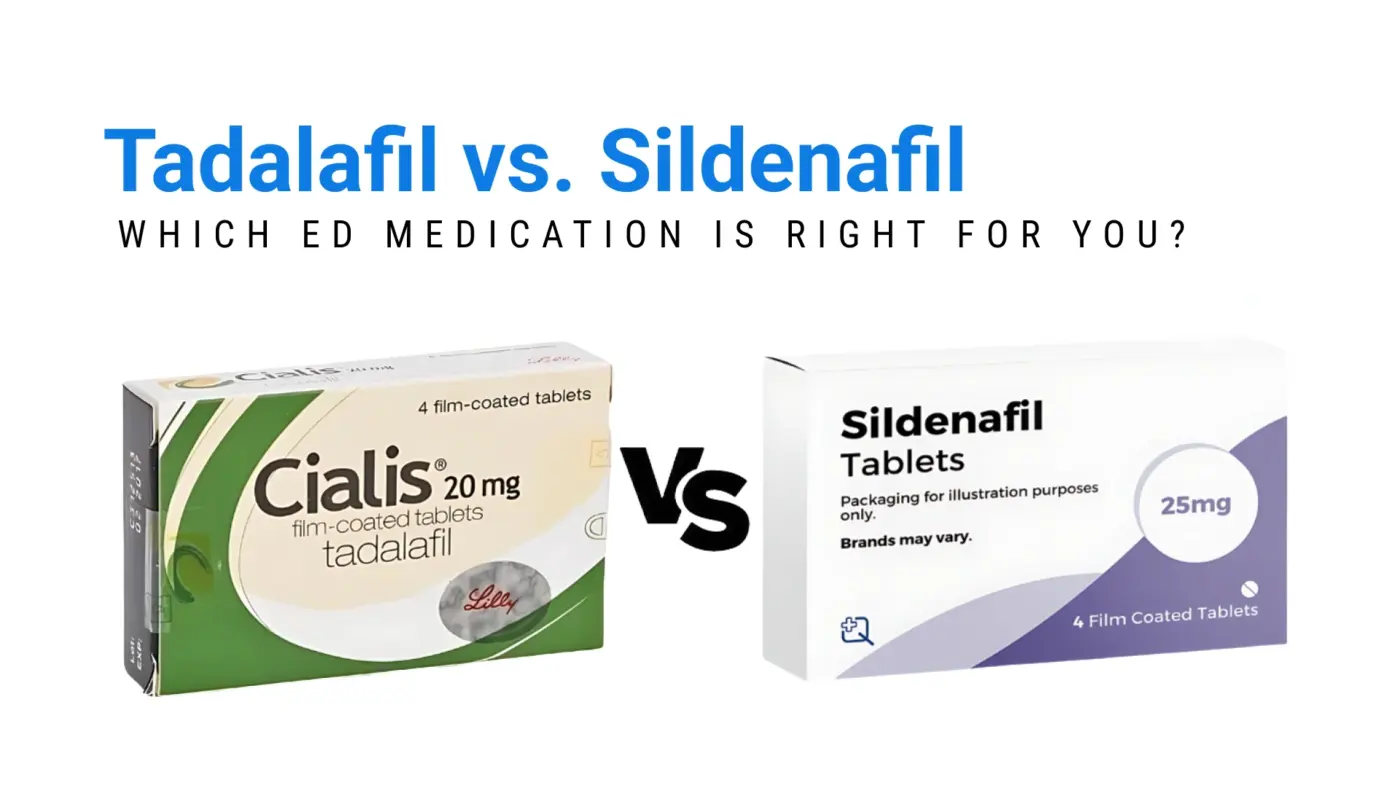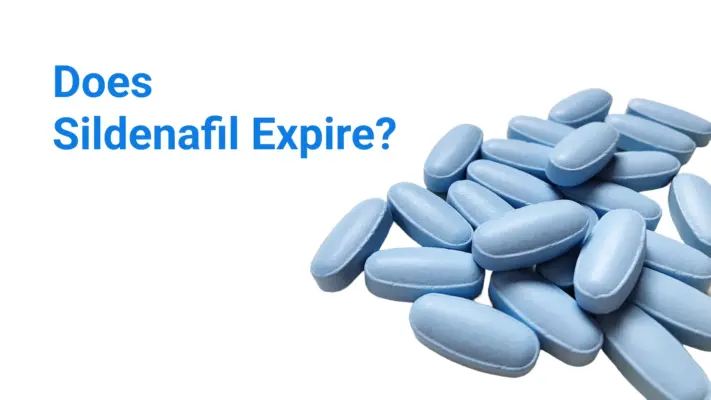Tadalafil vs. Sildenafil: A Comprehensive Comparison

Erectile dysfunction (ED) is a common condition that affects men of all ages. Medications like Tadalafil and Sildenafil provide effective relief, but choosing the right one is essential. Each medication works differently, with variations in onset time, duration, and side effects.
Understanding these differences helps men make informed decisions based on their lifestyle, health needs, and treatment goals. Comparing Tadalafil and Sildenafil ensures you select the medication that best supports your confidence, performance, and overall satisfaction. This guide will help you navigate these options and find the right fit for you.
Table of Contents
Understanding Tadalafil and Sildenafil
Tadalafil (Cialis) and Sildenafil (Viagra) are both PDE5 inhibitors designed to improve blood flow to the penis. They help you achieve and maintain erections during sexual activity. These medications work by relaxing the blood vessels, enabling better blood flow when sexually aroused. However, despite their shared purpose, their unique features might influence your choice.
How Tadalafil and Sildenafil Work in the Body
Both Tadalafil and Sildenafil work by blocking the enzyme phosphodiesterase type 5 (PDE5). PDE5 reduces blood flow to the penis, making it harder to achieve an erection. By inhibiting this enzyme, these medications enhance the effects of nitric oxide, which relaxes blood vessels and improves blood flow. This allows for a firm erection during sexual arousal.
Key Differences in Their Action
- Speed of Effect:
- Sildenafil: Typically takes 30 to 60 minutes to work. Its onset can be delayed if taken after a heavy or fatty meal.
- Tadalafil: Begins working in about 15 to 30 minutes and is less affected by food, making it more convenient for users who don’t want to plan meals around their medication.
- Duration of Effect:
- Sildenafil: Lasts for about 4 to 6 hours, requiring users to time its use around planned sexual activity.
- Tadalafil: Can remain effective for up to 36 hours, offering greater flexibility and spontaneity. For instance, a single dose taken on Friday night could still be effective on Saturday evening, reducing the need for precise timing and allowing for a more relaxed approach to intimacy.
- Sildenafil: Typically takes 30 to 60 minutes to work. Its onset can be delayed if taken after a heavy or fatty meal.
- Tadalafil: Begins working in about 15 to 30 minutes and is less affected by food, making it more convenient for users who don’t want to plan meals around their medication.
- Sildenafil: Lasts for about 4 to 6 hours, requiring users to time its use around planned sexual activity.
- Tadalafil: Can remain effective for up to 36 hours, offering greater flexibility and spontaneity. For instance, a single dose taken on Friday night could still be effective on Saturday evening, reducing the need for precise timing and allowing for a more relaxed approach to intimacy.
While PDE5 inhibitors address blood flow issues, ED can also stem from other causes like stress, hormonal imbalances, or chronic illnesses. Consulting a healthcare provider ensures a comprehensive evaluation and treatment plan tailored to your needs.
Duration of Action: How Long Do They Last?
The length of time these medications stay active is one of their most significant differences. If you prefer a medication that allows for a natural and less time-restricted sexual experience, Tadalafil might be a better choice. On the other hand, if you only need short-term support, Sildenafil can be effective without lasting too long in your system.
Dosage Comparisons Between Tadalafil and Sildenafil
Both Tadalafil and Sildenafil offer varied dosage options tailored to individual needs. The dosage choice depends on your age, overall health, and the severity of your condition.

Sildenafil Dosage
- Typical Range: 25 mg to 100 mg per dose.
- Initial Dose: Doctors often start with 50 mg and adjust based on effectiveness and side effects.
- Sildenafil is taken as needed, usually 30-60 minutes before sexual activity. Its effects last 4-6 hours, requiring some planning.
Tadalafil Dosage
- Daily Dose: 2.5 mg to 5 mg.
- Ideal for men who prefer spontaneity, as it maintains a steady level in the bloodstream. This eliminates the need for planning sexual activity.
- As-Needed Dose: 10 mg to 20 mg.
- Taken 30 minutes before activity, with effects lasting up to 36 hours, offering more flexibility than Sildenafil.
- Daily Dose: 2.5 mg to 5 mg.
- Ideal for men who prefer spontaneity, as it maintains a steady level in the bloodstream. This eliminates the need for planning sexual activity.
- As-Needed Dose: 10 mg to 20 mg.
- Taken 30 minutes before activity, with effects lasting up to 36 hours, offering more flexibility than Sildenafil.
Daily Tadalafil is particularly convenient for men who engage in sexual activity more than twice a week. In contrast, Sildenafil and as-needed Tadalafil are better suited for occasional use.
For personalised advice, consult your doctor or refer to our detailed Sildenafil Citrate Dosage Guide to find the best option for your needs.
Side Effects and Safety Profile
Common Side Effects
Understanding the potential side effects of Tadalafil and Sildenafil is crucial for safe use. While they share many common side effects, some differences exist.
Common Side Effects
Both medications may cause:
- Headaches
- Flushing (warmth or redness, especially in the face)
- Nasal congestion
- Stomach upset
These effects are generally mild and subside on their own.
Side Effects Specific to Tadalafil
- Back pain
- Muscle aches (myalgia)
These are more common with Tadalafil than Sildenafil. They usually appear 12-24 hours after taking the medication and resolve within 48 hours.
When to Seek Medical Help
While serious side effects are rare, they require immediate medical attention:
- Chest pain: Could indicate a serious cardiovascular issue.
- Prolonged erections (priapism): Erections lasting more than 4 hours can damage penile tissue.
- Sudden vision or hearing loss: This may signal a severe reaction to the medication.
- Severe dizziness or fainting: Could indicate a sharp drop in blood pressure.
Important Note
If you experience persistent or severe side effects, stop taking the medication and contact your doctor promptly.
By understanding these risks, you can better differentiate between Tadalafil and Sildenafil and make informed decisions under your doctor’s guidance.
Price Comparison: Tadalafil vs. Sildenafil
Generic Options
Generic Sildenafil and Tadalafil are significantly cheaper than their brand-name counterparts, Viagra and Cialis. Both generics offer the same effectiveness at a fraction of the cost.
Factors Affecting Cost
The cost of these medications can vary based on:
- Dosage strength
- Insurance coverage
- Where you purchase them (online or in-store)
If budget is a major concern, generic Sildenafil is often the most affordable option. However, Tadalafil’s longer duration might mean fewer pills overall, which can balance the cost over time.
Deciding Between Tadalafil and Sildenafil
Tadalafil or Sildenafil: Which One Should You Choose?
Choosing the right medication depends on your lifestyle, preferences, and health. Here’s a closer look to help you evaluate:
Tadalafil: The Long-Lasting Option
Best For:
- Men who prefer flexibility and spontaneity.
- Those who engage in sexual activity multiple times a week.
If you value not having to plan ahead, Tadalafil’s daily low-dose (2.5-5 mg) option is ideal for consistent readiness. For weekend getaways or extended periods of activity, its as-needed dose (10-20 mg) lasts up to 36 hours, offering unmatched convenience.
Sildenafil: The Cost-Effective Choice
Best For:
- Occasional users who can plan ahead.
- Those prioritizing affordability.
If you only need ED support occasionally, Sildenafil’s shorter duration (4-6 hours) is effective for planned activity. It’s also a more budget-friendly option for those seeking lower-cost alternatives.
Key Similarities
- Both medications interact with nitrates (for chest pain) and alpha-blockers (for blood pressure or prostate issues), which can cause dangerous drops in blood pressure.
- Neither is a permanent cure for ED; they offer temporary support for symptoms.
Important Considerations
- Consult your doctor if you take medications for:
- Heart conditions (e.g., nitrates).
- High blood pressure or prostate problems (e.g., alpha-blockers).
- Pulmonary arterial hypertension (PAH), as some medications overlap with these ED drugs.
Your doctor can evaluate your overall health, lifestyle, and concurrent medications to recommend the safest and most effective option. For more details, explore our Sildenafil Citrate Guide to understand its specific benefits and uses.
Conclusion
Tadalafil and Sildenafil are both effective for treating ED, but their differences cater to distinct needs:
| Feature | Tadalafil | Sildenafil |
| Duration | Up to 36 hours | 4-6 hours |
| Best For | Spontaneous, frequent activity | Occasional, planned use |
| Dosing Options | Daily (2.5-5 mg) or as-needed (10-20 mg) | As-needed (25-100 mg) |
| Cost | Higher, but provides longer flexibility | More affordable for short-term use |
| Onset of Action | 30 minutes to 2 hours | 30-60 minutes |
Which One Is Right for You?
- Choose Tadalafil if you want longer-lasting effects or prefer daily dosing for spontaneity.
- Opt for Sildenafil if you’re seeking an affordable, short-term solution.
Final Advice
Ultimately, your choice should depend on your health, lifestyle, and preferences. Don’t hesitate to talk to your doctor to find the best solution for your needs. For a deeper dive into proper dosing, check out our Sildenafil Citrate Dosage Guide. If you’re considering dual-action solutions, explore Cenforce D Overview for comprehensive ED and PE treatment options.
Disclaimer
HisBlue is not a substitute for professional medical care or advice from your doctor. The health information on the HisBlue website is general and provided for your information only. We have ensured our content is accurate and current, with reviews by expert doctors. However, we cannot guarantee its accuracy or timeliness. This information is not meant to replace the diagnosis, treatment, or judgement of your doctor or another qualified healthcare provider.


